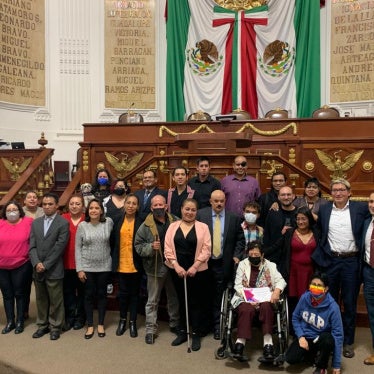(New York) – Jamaican authorities should take prompt action to ensure that people with disabilities can vote in the elections on December 29, 2011, Human Rights Watch said today.
Director of Elections Orrett Fisher has publicly acknowledged that the government has not taken steps to ensure that polling places throughout Jamaica will be accessible for people with disabilities. According to the government website Jamaica Information Service, at a recent meeting organized by disabled persons organizations, Fisher explained that the “law provides for you to be assisted in casting your ballot,” and suggested ways to improve accommodations for people with disabilities in the future. However, he added that “it would not be practical” to invest significant government funds to rearrange polling places to ensure accessibility.
“Mr. Fisher is right that Jamaica needs to do more to improve accessibility in the future,” said Rebecca Schleifer, advocacy director of the Health and Human Rights Program at Human Rights Watch. “But Jamaica should not get away with simply saying that it’s too late now and will cost too much. While it may be difficult to do everything necessary before next week’s elections, it should do whatever it can to enable voters with disabilities to cast their ballots.”
The new Convention on the Rights of Persons with Disabilities (CRPD) guarantees the right to political participation to all people with disabilities, without exception. Jamaica was the first country to ratify this important treaty in March 2007, which signifies its commitment to ensuring equal rights – including political participation – for all persons with disabilities.
Ensuring the right to political participation includes removing physical and communication barriers that effectively deny this right, Human Rights Watch said. The CRPD explains that states must ensure that their “voting procedures, facilities and materials are appropriate, accessible and easy to understand and use.”
It also requires States parties to adopt “appropriate measures to ensure to persons with disabilities access, on an equal basis with others, to the physical environment, to transportation, to information and communications, including information and communications technologies and systems, and to other facilities and services open or provided to the public, both in urban and in rural areas.” In this effort, the government must work closely with disabled persons organizations and persons with different disabilities themselves to ensure that appropriate measures are taken to uphold their rights.
With respect to the political process, this means governments must provide accessible polling places and transportation to the polling place. It also means that governments must make sure that ballots and voter education materials are available in accessible formats such as Braille, easy-to-read, and sign language.
To comply with its international and domestic legal obligations, there are a number of practical steps that Jamaica can take to make the electoral process accessible to people with various disabilities, and some of them can be acted on even before the December 29th elections, Human Rights Watch said. These steps include providing Braille ballots (or Braille templates to superimpose on printed ballots) and information about candidates and the political process in easy-to-understand formats, building ramps, granting priority in voting lines, and allowing for assistance in the act of voting for those unable physically to vote by themselves.
Especially given the short time frame, relocation of polling places – including moving ballot boxes to ground floor sites for individual voters – and allowing voting by absentee ballot should also be considered. Widespread dissemination of information about election access and training election officers on how to interact with and support people with various types of disabilities are also critically important, Human Rights Watch said.
“Jamaica needs to act swiftly to ensure that polling places throughout the island are actually accessible to people with disabilities,” Schleifer said. “This means doing everything possible to make sure that they can reach their polling places, and cast ballots once they are there.”








